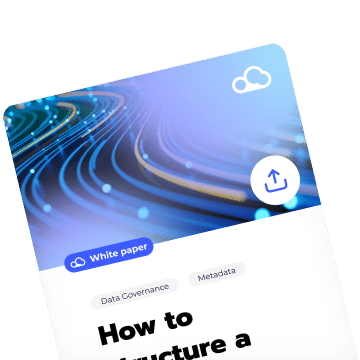In today’s increasingly digitalized world, data has become the lifeblood of organizations, powering their operations and driving decision-making processes. As companies amass vast amounts of data from various sources, the need for effective data governance has never been more critical.
However, data governance alone is not sufficient – It must go hand-in-hand with metadata management.
Metadata, the often invisible and discreet companion of data, plays a pivotal role in organizing, qualifying, and unlocking the true value of data. Metadata is the data that describes the data and makes it understandable and exploitable (source, definition, type, precision, quality, or context of use).In this article, we delve into the inseparable connection between data and metadata, exploring how a robust metadata management strategy complements data governance efforts, enhances data utilization, and fosters a culture of shared understanding and collaboration within organizations.
Data governance is a necessity
The increasing digitalization of companies means that data processing services are multiplying and crossing paths on various new subjects. Projects and departments composed of experts in big data, CRM, analytics, and data visualization work together to collect and enhance more and more data to have the information that will make a difference.
There are several risks for organizations at the early stages of data governance:
- The explosion in volumes and the poorly controlled multiplication of data sources make their exploitation complex, undermine their clarity, and make them more difficult to interpret
- Disparate and heterogeneous data can ultimately contradict each other, due to a lack of shared definition or understanding, methods, or the multiplication of tools used
Day-to-day operational governance helps to coordinate the understanding, use, enrichment, and transformation various stakeholders can bring to the data to exploit it. It guarantees:
- A shared understanding for increased legitimacy of the reports produced, removing ambiguities of understanding and interpretation
- Uniformity of formats, which simplifies the use of data and facilitates comparisons and interoperability in different business uses
- An increasing usefulness of the available data, by optimizing the collections, minimizing redundant exploitations, and highlighting under-exploited data
Metadata: A powerful catalyst of data governance
Gathering an abundance of data should not be a goal in itself. Data that is incomplete, imprecise, or impossible to interpret or use is of no real use to organizations. Having well-defined, orderly, hierarchical data with an operational governance strategy that frames the collection, storage, and daily data uses can be a huge asset for a company.
Metadata is essential for organizations to use to effectively enhance data quality, as it:
- Allows organizations to qualify their data: It facilitates the understanding, search, and identification of data in circulation in the company. Metadata is an important prerequisite for any data governance initiative.
- Is the key to a shared mapping of enterprise data: It ensures optimal storage optimization and an effective data retention policy. The risk of loss or deterioration of useful data is limited or even eliminated when utilizing properly stored metadata.
- Allows for the rapid identification of collected personal data and deletion if necessary





